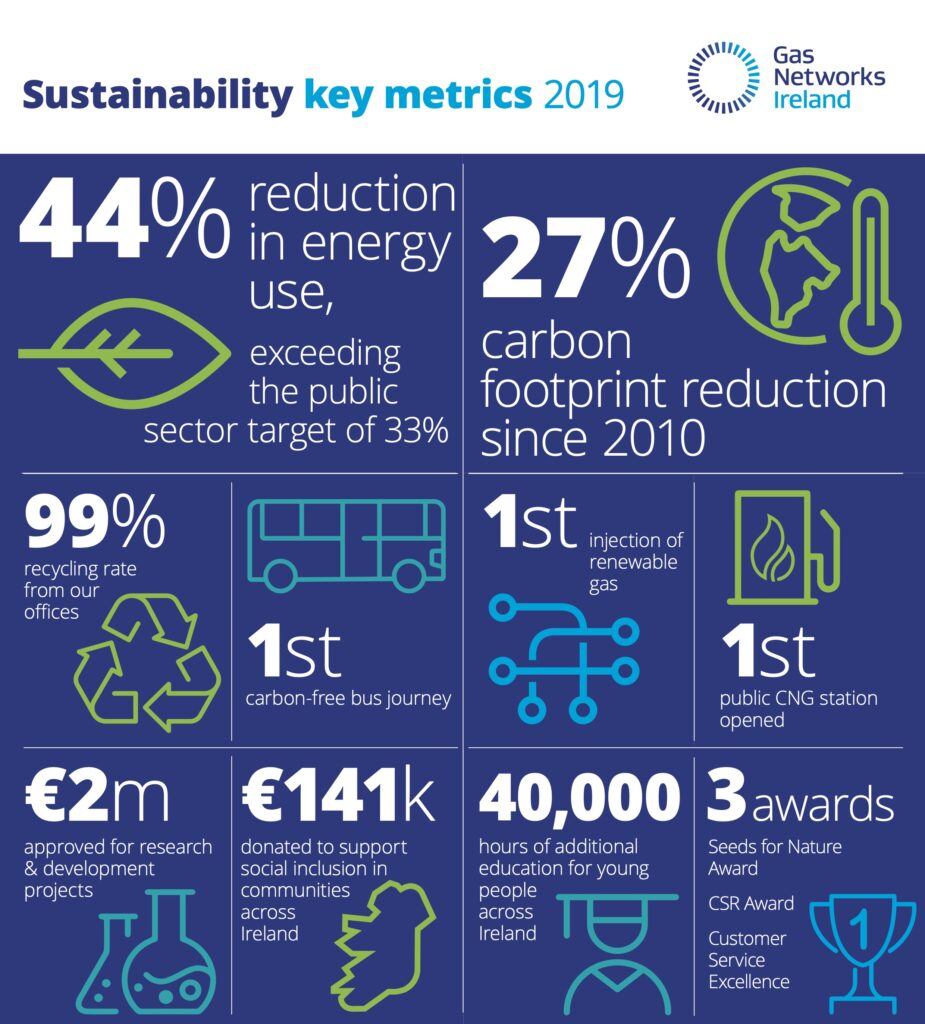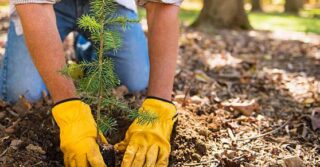Gas Networks Ireland growing sustainably and responsibly
Gas Networks Ireland has reduced its carbon footprint by 27% over the last decade, according to the
company’s 2019 Sustainability Report. The network operators also exceeded the public sector energy reduction target by 11%, delivering a 44% reduction, with plans to reduce its carbon emissions even further in the future, both within their own operations and from decarbonising the gas transported through the network.
Sustainability Highlights:
- 27% carbon footprint reduction since 2010.
- Exceeded public sector energy reduction target of 33% – achieving 44%.
- 99% recycling rate from its offices.
- Published Vision 2050 – A Net Zero Carbon Gas Network for Ireland.
- €2 million approved for research and development in low carbon energy projects.
- Supported 40,000 hours of additional education for young people across Ireland.
- 1,461 staff volunteer hours.
Entitled Sustainability in Action, Gas Networks Ireland’s second annual report also highlights a 99% recycling rate across its offices. Gas Networks Ireland’s Sustainability Manager, Anne Moore, said: “We are always mindful of our sustainability responsibilities and aim to contribute to the protection of the environment while supporting the social and economic development of the communities we operate in, as well as the wider economy. We believe that our Sustainability in Action strategy will continue to improve our business in a sustainable and responsible way, particularly now as we navigate new ways of working through the unprecedented COVID-19 pandemic.” Gas Networks Ireland connects over 705,000 businesses and homes to Ireland’s gas network, one of the most modern and safe gas networks in the world, with a vision to becoming fully decarbonised.
In 2019, together with parent company Ervia, Gas Networks Ireland published Vision 2050, which plots a roadmap to a carbon neutral gas network with reduced emissions across every sector of the Irish economy, by transporting renewable gases such as biomethane and hydrogen. This vision continues to evolve in line with local and EU policy developments. As part of this journey to a clean energy future, Gas Networks Ireland last year commissioned the first purpose-built renewable gas entry point in Cush, Co Kildare, through which renewable gas is now commercially flowing onto the network.
A hydrogen innovation facility is also under construction in Brownsbarn, Dublin and a further €2million funding for research and development of low carbon energy projects has been committed through the Gas Innovation Fund.
“We are committed to ensuring that sustainability is at the forefront of everything we do and to helping Ireland to reduce its carbon emissions. Natural gas emits 40% less CO₂ than coal and 22% less than oil, however our vision is to significantly reduce emissions and have a carbon neutral gas network,” Ms Moore said.
Gas Networks Ireland is one of only 34 companies in Ireland to hold the Business Working Responsibly Mark for its responsible and sustainable business practices. The work the company is doing to honour its low carbon pledge and reduce its energy consumption was recently presented as a case study by Business in the Community, Ireland’s leading adviser on Sustainability and Corporate Social Responsibility.
Gas Networks Ireland’s sustainability achievements were recognised earlier this year when the utility won both the Sustainable Energy Achievement Award and the Green Large Organisation of the Year Award at the Green Awards.
The company has also recently been shortlisted for three Chambers Ireland Sustainable Business Impact Awards. “We have set a benchmark and for that I am very proud. Winning and being shortlisted for awards is another important validation for us, a reflection of how we continually improve as a business, how we serve our customers, and is a testament to our employees,” Ms Moore said.
Environmental Sustainability is one of three key pillars in Gas Networks Ireland’s Sustainability Strategy, with Social and Economic Sustainability also a key focus in alignment with the United Nations’ Sustainable Development Goals. Staff at Gas Networks Ireland volunteered 1,460 hours in 2019, supported 40,000 hours of additional education for young people across Ireland and donated €141,000 to support social inclusion in communities across Ireland. The company also introduced agile working for its staff as part of its Social Sustainability Strategy.
“We introduced agile working last year enabling employees to work from home one day a week, reducing the need to commute, which also reduced our footprint. We didn’t know it at the time, but this meant we were well-positioned for the lockdown, with 90% of our team working from home,” Ms Moore said.
The full report can be found here.






